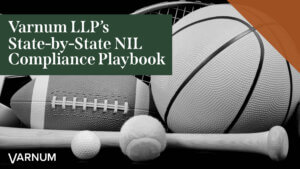In a significant development for higher education athletic boosters, the Internal Revenue Service (IRS) recently declared that Name, Image and Likeness (NIL) collectives, in many cases, are not tax-exempt entities. This ruling carries significant implications for NIL collectives, as it could directly affect tax deductions for athletic donors and the organizational structure of these collectives.
On May 23, 2023, the IRS issued a statement asserting that NIL collectives operating for a substantial nonexempt purpose (e.g., serving the private interests of student-athletes), which is more than incidental to any exempt purpose furthered by the activity, do not qualify for tax-exempt status, reshaping previous assumptions that these collectives operate as tax-exempt entities, like nonprofit organizations. In its memo, the IRS argues that in most cases, NIL collectives, unlike traditional nonprofit organizations, do not serve a charitable purpose or provide a public benefit. Therefore, they do not meet the criteria for tax-exempt status under the Internal Revenue Code.
Tax Implications for NIL Collectives
The IRS ruling is expected to have a significant impact on the operations and appeal of NIL collectives. By removing the tax-exempt status, this ruling could deter donors from joining or forming these collectives in the future. The financial advantages previously associated with the collectives may be reduced and could also lead to increased administrative burdens for NIL collectives. Collectives may be subject to additional reporting and compliance requirements that come with being taxable entities, potentially straining the resources and capabilities of these collectives and requiring them to adapt and restructure their operations accordingly.
Conclusion
Although it has not set precedent, the IRS’s declaration that NIL collectives, in many cases, are not tax-exempt marks a significant shift in the tax treatment of athletic booster activity. While it’s still uncertain how this decision will impact the popularity and viability of NIL collectives going forward, the IRS ruling serves as a reminder of the evolving landscape surrounding NIL and the continuing investigations into the frameworks that govern NIL policies.
Download Varnum's State-by-State NIL Compliance Playbook
 To aid individuals, schools and collectives with the often inconsistent and rapidly developing legislative and executive actions of the states, Varnum’s dedicated team of NIL attorneys created an all-inclusive, state-by-state compliance playbook. Learn more and download your free copy: varnumlaw.com/NILguide
To aid individuals, schools and collectives with the often inconsistent and rapidly developing legislative and executive actions of the states, Varnum’s dedicated team of NIL attorneys created an all-inclusive, state-by-state compliance playbook. Learn more and download your free copy: varnumlaw.com/NILguide


